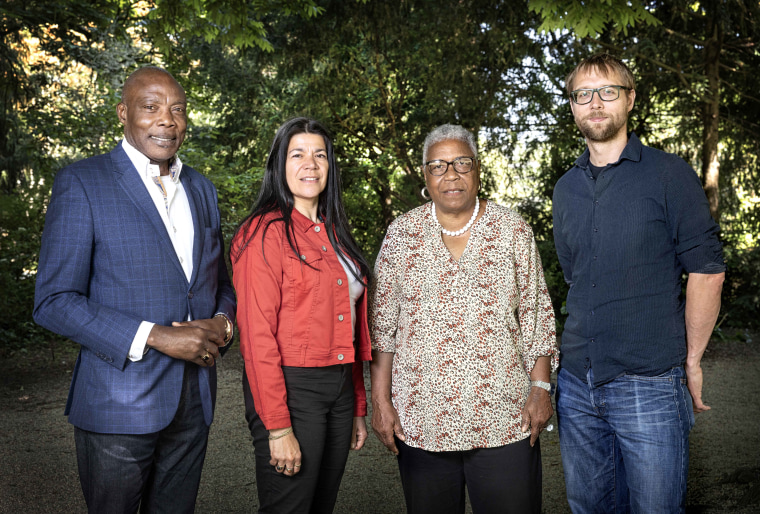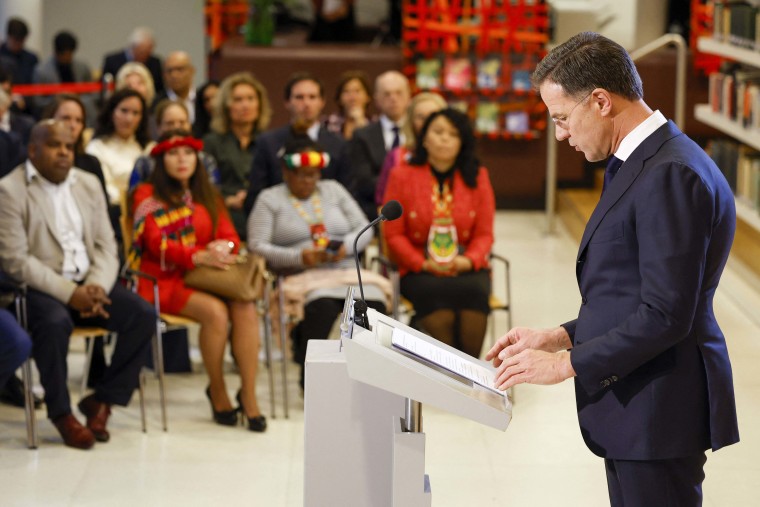[ad_1]
At the trade’s height in the 17th and 18th centuries, more than 1,000 enslaved people were taken to Suriname every year to work on sugar plantations, according to State and Slavery. More than 90% of the population in what was then a South American colony were enslaved and conditions were so harsh that the number of births never outpaced the number of deaths, the study showed.
The study’s findings have surprised many in the Netherlands, including those who read advance copies, said one of its editors, Esther Captain, an expert at the Royal Netherlands Institute of Southeast Asian and Caribbean Studies, in the Dutch city of Leiden.
“I was shocked because you would assume that [it is] basic in general knowledge, but it’s not,” she told NBC News by telephone.
“I think it is to do with the fact that this is confronting our self-image. We used to sell ourselves as tolerant, open-minded and democratic. And I think this is challenging our very self image, and that hurts.”
The church, the navy and the royal family each played a part in the human trafficking of an estimated 600,000 people, mainly to Suriname and the Antilles islands in the Caribbean. Successive generations were born into this often deadly cycle of servitude.
Plantation owners busied themselves with reading, writing, sports and other leisure pursuits as workers toiled in the hot sun while facing physical and sexual abuse.
The Dutch began trading slaves in the 1500s and became a major player in the 1600s. Slavery only ended in the Dutch Caribbean islands and Suriname in 1863 — although some slaves were not freed for another 10 years. The Netherlands relented in the face of international pressure, not least from Britain, which ended its part in the Atlantic slave trade in 1808. (The United States abolished slavery in 1865.)

Slavery was also enforced in the Dutch East Indies — a major colony that included modern-day Indonesia — until the 19th century.
In response to questions from NBC News, Voorst, Pauline van Voorst, a spokesperson for the Dutch government, echoed Rutte’s apology in admitting the country had too late in acting on the legacy of slavery.
“For centuries, under Dutch state authority, human dignity was violated in the most horrific way possible. And successive Dutch governments after 1863 failed to adequately see and acknowledge that our slavery past continued to have negative effects and still does,” she said.
On the question of reparations, she said that various assistance packages were already in place to help former colonies, designed to improve local economies.
The State and Slavery project was funded by a 200 million euro (about $218 million) commission to explore and expose the country’s colonial past, announced by Rutte in December. Some countries have made similar moves and even paid reparations.
King Charles III said in April that Buckingham Palace will cooperate with research into the British royalty’s links to slavery, and Belgium set up a commission to study its links in 2020. Belgian lawmakers spent hours last year debating whether and how to make an apology but came to no agreement, and the British project is not due to complete until 2026.
Belgium’s King Philippe expressed his “deepest regrets” last June while on a trip to the Democratic Republic of the Congo, where from 1885 to 1908 the government, under the supervision of King Leopold II, extracted a fortune in natural resources while enslaving, maiming, torturing and killing many thousands of people.
Britain has “fallen behind the international conversation” in owning up to its colonial past, said Sathnam Sanghera, a journalist and author of “Empireland,” a bestselling 2021 book about the legacy of British colonialism.
“That the Dutch have commissioned historians and given an apology just highlights how little we’ve done,” he said.
King Charles’ coronation, which included items glittering with precious gems taken from British colonies, underlined Britain’s imperial past.
“It kept coming up during the coronation, every other Commonwealth was raising it, whether it was loot, slavery or the legacy of it,” Sanghera said. “This is going to be the conversation for the next 20 years.”
Britain was an early and enthusiastic participant in the transatlantic slave trade in the 16th and 17th centuries, which helped build an empire that reigned over some 400 million inhabitants at its height in the early 20th century.

In 2021, Germany called its actions in Namibia “genocide” and pledged 1.1 billion euros ($1.2 billion) in reparations, and the same year French President Emmanuel Macron apologized to Algerians who fought alongside French forces but were later killed as traitors.
“You have Germany doing that, you have the Netherlands doing that. And it pressures Belgium, who have kind of stuck their heels in the sand,” said Jeremiah Garsha, an expert in colonial history at University College Dublin.
The State and Slavery project made headlines last week for revealing how much money Dutch kings made from slavery. But Garsha added that reducing an entire country’s colonial misdeeds to a number is in itself a continuation of the colonial attitude: that people can be financial assets.
“Those are numbers that continue to kind of enslave people in our mindset — they’re chattel, they’re property. No. These are experiences, these are human experiences,” he said. “That’s what I want to recover.”
 Latest Breaking News Online News Portal
Latest Breaking News Online News Portal




